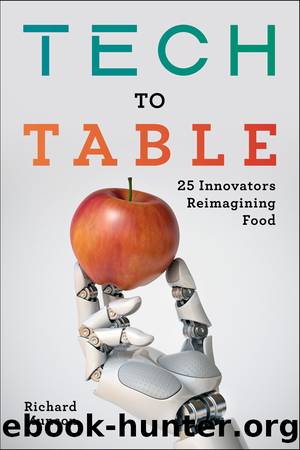Tech to Table by Richard Munson

Author:Richard Munson [Munson, Richard]
Language: eng
Format: epub
ISBN: 9781642831917
Publisher: Island Press
Diane Wu (left) and Poornima Parameswaran (right), cofounders of Trace Genomics. Credit: Trace Genomics.
We then âdecode the soil data,â say the Trace Genomics cofounders. âHarnessing machine learning, we conduct high-speed, cost-efficient data analysis to compare against a large and growing set of soil data.â5 Their core market is farmers, who use their information to make better decisions about their crops. Jerry Dove, an Iowa farmer, attests, âItâs good to see this new data, so we can put values on how we are making improvements.â6
The start-upâs founders also tackle broader environmental problems. Their belowground insights reveal the damage done by industrial agricultureâs multidecade war on beneficial microbes and highlight how that harm can be reversed. And as climate change threatens crops and accelerates diseases and pest invasions, they use genomics analysis to calculate whether individual fields could benefit from drought- or heat-resistant plants and resilient microbes.
With this information in hand, Trace Genomics identifies biological seed coatings that stimulate soil microbes to release nitrogen and other nutrients that benefit crop roots. (Chapter 18 profiles an innovator creating such coatings.) âItâs a new field,â says Parameswaran, âexciting because you are creating new tools and applications.â7
Although based on natural ingredients, those applications have raised the ire of some advocates of organic and regenerative agriculture. âThe microbial communities that exist in animal guts and in the soil have evolved over eons,â asserts author Tom Philpott, the food and agriculture correspondent for Mother Jones magazine. âI suspect that diverse diets and crop rotationsânot lab-grown potionsâare key to engendering healthy biomes, both within our bodies and in the dirt.â8
Despite this criticism, the coatings allow farmers to vastly reduce their spraying of expensive synthetic fertilizers that pollute waterways. Trace Genomicsâ data and analytics also help cultivators reduce disease. Soybean growers, for instance, fear a fungus that causes sudden death syndrome and attacks plants so late in the growing season that little can be done to treat the disease and save the crop. By utilizing Traceâs soil intelligence, however, farmers can detect traces of the fungus early, in time to protect their plants proactively.
In addition to its detractors, the firm faces numerous competitors and challenges. Other biotechnology firmsâsuch as Benson Hill in St. Louis, Missouri, and AgBiome in Durham, North Carolinaâutilize cloud-based biology and genomics to offer advanced screenings for the agricultural sector, and Alphabetâs X lab, the former Google division that launched the Waymo self-driving car, has developed a four-wheel rover-like prototype, what it calls a âplant buggy,â that studies soils and environmental factors with a mix of cameras and sensors. To show unique value to farmers, many of whom distrust new technologies, Wu and Parameswaran recognize they must raise more capital, lower the costs of soil studies, and reduce the analysis time from days to seconds.
Although neither founder has worked the land, both claim a family relationship, with Wuâs grandfather a third-generation produce grower and Parameswaranâs uncle the owner of a local fishery. Being newcomers themselves to farming, the pair initially talked a lot with cultivators, learning their perspectives and concerns.
Download
This site does not store any files on its server. We only index and link to content provided by other sites. Please contact the content providers to delete copyright contents if any and email us, we'll remove relevant links or contents immediately.
Zero to IPO: Over $1 Trillion of Actionable Advice from the World's Most Successful Entrepreneurs by Frederic Kerrest(4570)
Machine Learning at Scale with H2O by Gregory Keys | David Whiting(4313)
Never by Ken Follett(3957)
Harry Potter and the Goblet Of Fire by J.K. Rowling(3857)
Ogilvy on Advertising by David Ogilvy(3622)
Shadow of Night by Deborah Harkness(3368)
The Man Who Died Twice by Richard Osman(3080)
Book of Life by Deborah Harkness(2939)
The Tipping Point by Malcolm Gladwell(2923)
Will by Will Smith(2920)
Purple Hibiscus by Chimamanda Ngozi Adichie(2855)
0041152001443424520 .pdf by Unknown(2846)
My Brilliant Friend by Elena Ferrante(2831)
How Proust Can Change Your Life by Alain De Botton(2814)
How to Pay Zero Taxes, 2018 by Jeff A. Schnepper(2655)
Hooked: A Dark, Contemporary Romance (Never After Series) by Emily McIntire(2554)
Rationality by Steven Pinker(2365)
Can't Hurt Me: Master Your Mind and Defy the Odds - Clean Edition by David Goggins(2341)
Borders by unknow(2315)
